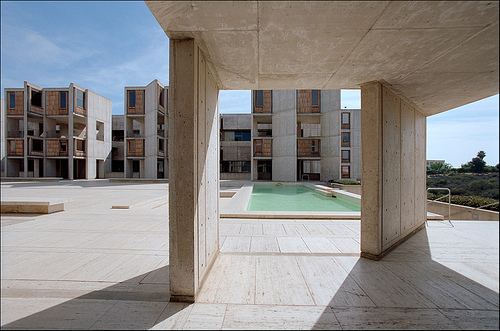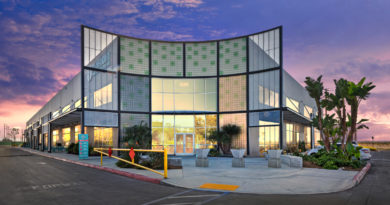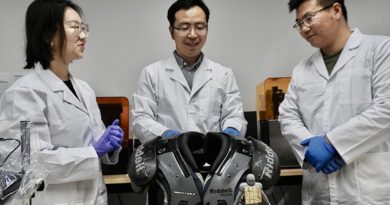Daily Business Report-Nov. 21, 2017
Illustration by Dan Hubig for CALmatters.
Lawmakers to Californians:
Do as we say, not as we do
By Laurel Rosenhall | CALmatters
With a declaration that “public servants best serve the citizenry when they can be candid and honest without reservation in conducting the people’s business,” lawmakers passed the California Whistleblower Protection Act in 1999.
The idea was to protect workers who report misconduct, so that they can blow the whistle on bad actors without losing their jobs. The bill at that time covered workers at state agencies and California’s two public university systems. Lawmakers expanded it in 2010 to cover employees of the state’s courts.
But one group of California government workers has never had whistleblower protection under the law: those who work for the lawmakers themselves. It’s an example of how the Legislature sometimes imposes laws on other people that it doesn’t adhere to itself.
“Lawmakers make laws that affect all of us, including them, and they are softening the blow of regulations for themselves,” said Jessica Levinson, a professor at Loyola Law School who chairs the Los Angeles Ethics Commission.
“It feels like double talk.”
The Legislature’s exemption from the Whistleblower Protection Act has garnered attention in recent weeks, as a groundswell of women complaining of pervasive sexual harassment in the state Capitol publicly call for such protections for legislative employees.
But the whistleblower act isn’t the only area of the law in which the Legislature has demonstrated a “do as I say, not as I do” mentality:
Public records
Want to know whom government officials are meeting with, talking to or emailing? Or how officials were disciplined after an investigation found them culpable of wrongdoing?
State agencies and local governments must release such information — calendars, emails and disciplinary records—under the California Public Records Act, which the Legislature created in 1968. But the same information is nearly impossible to get from state lawmakers because the Public Records Act does not apply to the Legislature.
Instead, lawmakers are covered by the Legislative Open Records Act, which they passed in 1975 in the wake of the Watergate scandal. The act that applies to them is riddled with exceptions, effectively keeping secret many documents that other branches of government must disclose.
“The Legislature has created in many areas a black box where the public can’t see records it would be entitled to see if the public officials at issue weren’t in the Legislature,” said David Snyder, executive director of the First Amendment Coalition, a nonprofit organization advocating government transparency.
The Legislature’s open-records law allows it to withhold investigations of wrongdoing, even when they led to disciplinary action. It also keeps secret correspondence by lawmakers and their staff, as well as officials’ calendars. The Legislature even refused to give reporters the calendars of two senators undergoing federal prosecution on corruption charges, until media companies sued and won a court order compelling their release.
Another difference: As more government agencies began storing information electronically, the Legislature updated the Public Records Act in 2000 to compel disclosure of digital records. Now state agencies and local governments must provide public records in any format in which they exist. That gives the public access to electronic records, such as databases, in their original digital format.
But the Legislature has never made the same update to its own open-records act. “It was a non-starter,” former Assemblyman Kevin Shelley told the Sacramento Bee in 2015.
Open meetings
The idea that government meetings should be open to the public, and designed to welcome public input, has been enshrined in California law for more than 60 years. In 1953 the Legislature passed the open-meeting law that applies to local governments, and in 1967 it passed a similar one for state agencies.
Yet the 1973 law it passed requiring open meetings of the Legislature does not follow the same rules. One major difference: It allows legislators to gather secretly in partisan caucuses.
When contentious issues hit the floor of the Assembly or the Senate, it’s common for one political party or the other to pause proceedings and call for a caucus. Legislators file out of the chamber and into two private meeting rooms where Democrats and Republicans separately gather for conversations that exclude the public and the press. They can hash out disagreements or craft strategy behind closed doors, then return to the chamber to publicly cast their votes.
Local governments, such as city councils, cannot do this. With a few limited exceptions, state law forbids a majority of a local board from gathering privately precisely because it shuts the public out of the decision-making process.
“I always remember county supervisors being rankled,” said Peter Detwiler, a retired long-time staffer to the state Senate’s local government committee. “‘You guys put these rules on us and you don’t ever put rules like that on yourself.’”
The same laws also slow down decision-making by local governments and state agencies so that the public can weigh in. Local governments must give at least three days’ notice before taking action, while state agencies have to post agendas 10 days in advance.
Legislators, until this year, did not have the same constraints. Though most bills go through a months-long process of public deliberations, a handful of bills each session were written just hours before lawmakers cast votes on them, leaving the public no time to offer their input. Democrats who control the Legislature said the last-minute lawmaking allowed them to put together sensitive compromises that could have blown up with more public scrutiny.
But voters grew frustrated with the secrecy. A Republican donor worked with non-partisan good-government groups to put Proposition 54 on last year’s ballot, requiring that bills be written and posted online for at least three days before lawmakers can vote on them. The result: voters put a rule on legislators that the politicians wouldn’t put on themselves.
Out of state travel
With culture wars raging nationally over transgender rights, California’s liberal Legislature last year passed a law banning state-funded travel to states with laws that discriminate against gay or transgender people. Eight states are now on California’s no-go list. Some have laws that could forbid LGBT people from adopting children or exclude gay students from some school clubs; others have banned anti-discrimination policies that would allow transgender people to use the bathroom that matches their identity.
Yet while legislators have banned state-sponsored travel to Alabama, Kansas, Kentucky, Mississippi, North Carolina, South Dakota, Tennessee and Texas, they haven’t stopped traveling to those places themselves. In June, Democratic Sen. Ricardo Lara traveled to Texas for a conference of Latino government officials. Soon after, Democratic Sen. Bob Hertzberg went to Kentucky to study the state’s bail system.
Hertzberg was working on legislation to overhaul bail in California, and “felt it critical to observe first-hand the impact of bail reform in (Kentucky), which has a very well-established system of pretrial release,” his chief of staff Diane Griffiths wrote in an email.
The travel-ban bill does not exempt lawmakers — a late amendment actually specifies that it also applies to the Legislature — so how are these trips taking place? Lawmakers are getting around the law by using campaign funds (not tax-dollars) to pay for them.
The Legislature’s leaders declined to defend the exemptions, but in the past lawmakers have contended that they are justified because of the unique role of a law-making body and the need to protect legislators’ security. As far as critics are concerned, legislators get away with making exceptions for themselves because their hypocrisy doesn’t attract enough notice to generate mass outrage.
Right now there’s plenty of attention on the Legislature over its policies for dealing with sexual harassment — and some debate about whether extending the whistleblower act would help remedy the problem.
As is, the Legislature has internal personnel policies that forbid retaliation, and legislative employees are also covered by a different state law that prohibits retaliation for complaining about discrimination or harassment. But the whistleblower act goes even further, laying out a process for workers to confidentially file complaints to the independent state auditor.
Lawmakers will yet again consider a bill giving whistleblower protection to legislative staff when they return to Sacramento next year. GOP Assemblywoman Melissa Melendez of Lake Elsinore plans to re-introduce a measure that has stalled in the past. . And — in a nod to some who have say that her bill wouldn’t apply to employees reporting sexual harassment —she said she’ll add language explicitly stating that it does.
________________
Developers Announce Completion of
$91M Mixed-Use Project in East Village
Lowe, LaSalle Investment Management and I.D.E.A. Partners on Monday announced the completion of IDEA1 in Downtown San Diego, a $91 million, mixed-use creative urban living and work space with ground floor office and restaurants built around a public/collaborative gathering space.
IDEA1 is located on a full city block bounded by E, F, Park and 13th Streets in the innovation corridor in the Upper East Village known as I.D.E.A. District. IDEA1 is a mid-rise, six-story complex built around a ground floor communal gathering spot called The Hub that connects the residential, commercial, and recreational components. The Hub is accessible to the residents of the 295 apartments and live/work lofts, the 7,700 square feet of office space, the customers of the 5,000 square feet of ground floor restaurant spaces, and the broader community.
________________
San Diego No. 8 for Rising
Office Rents Nationally
San Diego was among the top markets in the country for rising office rents over the past two years, according to CBRE’s annual Tech-30 report, which measures the tech industry’s impact on office rents in the 30 leading tech markets in the U.S. and Canada. On the list of 30 markets, San Diego saw the eighth greatest rent growth; Orange County took the number one spot.
The influence of tech job creation on office market rent growth is pervasive across the U.S. and Canada, with 13 of the Tech-30 markets posting rent growth of 10 percent or more between Q2 2015 and Q2 2017. San Diego’s high-tech employment grew 4.4 percent over 2015 and 2016, with average office asking rents rising 13.7 percent to $34.08 from Q2 2015 to Q2 2017.
According to CBRE’s Tech-30 report, the willingness of tech companies to pay a premium for office space in the hottest tech submarkets is starting to spill over into neighboring submarkets as available space in tech hotspots is dwindling. As a result, adjacent submarkets and traditional downtowns with skylines — rather than the brick-and-beam buildings tech companies have demonstrated a preference for — are primed to benefit, creating opportunity for commercial real estate investors.
________________
NewSchool of Architecture & Design Leads
Effort to Revitalize Downtown National City
NewSchool of Architecture & Design announced an ambitious collaboration between the institution and several architecture, engineering, design and real estate development consultants in San Diego to revitalize the downtown of National City. NewSchool students and faculty will collaborate with the City of National City, the American Institute of Architects, Glumac Engineers, KPFF Consulting Engineers, Mackenzie Inc., Sillman Wright Architects, the San Diego State University Civil Engineering Department, University of California San Diego Structural Engineering Department, and Malik Infill Development.
NewSchool’s Integrated Design Studio is in its fifth year and, under the direction of faculty member Daniels Deutsch, has proposed new, sustainable designs, aimed to stimulate economic revitalization, in cities such as Portland, Seattle and Austin. This year, more than 70 undergraduate architecture students will collaborate over the next several months with a variety of municipal and industry partners to create a vision and strategies for the development of a new, sustainable urban neighborhood in downtown National City. The focus of the studio will be to create visions and identify design strategies for the development of the National City downtown area, following as well as enhancing its new Specific Plan strategies. Ultimately, following an in depth urban analysis and master plan phase, each student team will design an exemplary city block, which holistically takes into consideration the entire neighborhood and its immediate surroundings.
________________
Anti-Malaria Drug Shows
Promise as Zika Virus Treatment
A new collaborative study led by researchers at Sanford Burnham Prebys Medical Discovery Institute and UC San Diego School of Medicine has found that a medication used to prevent and treat malaria may also be effective for Zika virus. The drug, called chloroquine, has a long history of safe use during pregnancy, and is relatively inexpensive. The research was publishe in Scientific Reports.
“There is still an urgent need to bolster our preparedness and capacity to respond to the next Zika outbreak,” said Alexey Terskikh, associate professor at SBP. “Our latest research suggests the anti-malaria drug chloroquine may be an effective drug to treat and prevent Zika infections.”
________________
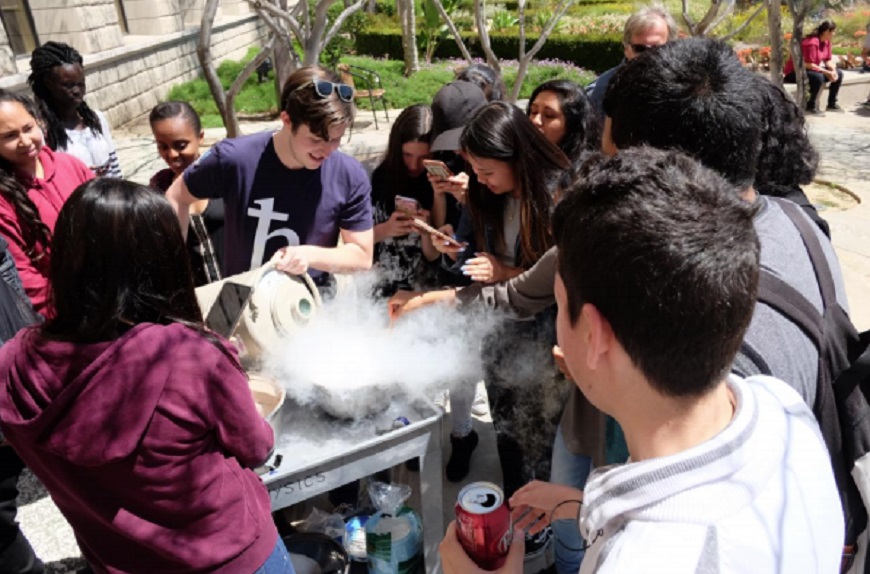
USD Physics Society Honored
for Work with Hoover High Students
Using a diffraction lab to measure the width of a hair, watching how an air current can ignite a fireball, and making ice cream from liquid nitrogen were some of the ways University of San Diego physics students shared their passion for science with students from Hoover High School.
This month, USD’s Society of Physics Students Chapter received the Blake Lilly Prize from the society’s National Council for its efforts to promote diversity and interest in science and mathematics to underrepresented students.
In making the award, judges said they “were impressed with the reach and scope of the chapter’s efforts.” Hoover High lead physics teacher Vincent Andrews added that the event “really made a positive difference in the outlook and aspirations of the students who attended.”
Andrews chose a group of 25 promising students for the day-long immersion project in the fall of 2016. After the success of the first event, another program was held in the spring of 2017.
“The visiting students had as much fun as the USD volunteers,” said Kathryn Regan, president of the 10-member USD chapter. “Hoover students would mention their interest or curiosity in a particular field or area of study and our members were able to enthusiastically validate and encourage their ambitions.”
The USD chapter hopes to continue the biannual program and expand it by adding more personal mentorship and hosting activities at Hoover to make them even more accessible to students.
________________
AV1 Subsidiary Wins Lighting
Contract for California Prison
Intelligent Lighting Solutions Inc., a minority-owned subsidiary of La Jolla-based AV1 Group Inc., has won a contract to provide lighting fixtures at a California prison. The custom lighting fixtures are to illuminate and protect the perimeter of the prison.
“We are very pleased to have been engaged by the State of California to bring our progressive LED technology to a state facility,” said AV1 Group Chief Executive Officer Bryen Beglinger. “The ultimate goal is to capture the complete lighting retrofit of the entire facility, which would be a substantial order for Intelligent Lighting Solutions.”
________________
Cal State San Marcos Professor Honored
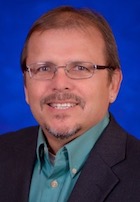
Keith Trujillo, a California State University San Marcos psychology professor and director of the university’s Office for Training, Research & Education in the Sciences, has been named a Fellow of the American Association for the Advancement of Science (AAAS).
This year, 396 members were awarded this honor by AAAS because of their scientifically or socially distinguished efforts to advance science or its applications. New Fellows will be presented with an official certificate and a gold and blue (representing science and engineering, respectively) rosette pin on Feb. 17 at the AAAS Fellows Forum during the 2018 AAAS annual Meeting in Austin, Texas.
This year’s AAAS Fellows will be formally announced in the AAAS News & Notes section of the journal “Science” on Nov. 24.
Trujillo was elected as an AAAS Fellow for distinguished contributions to science and neuroscience education and mentoring that have advanced diversity at local, regional and national levels.
________________
Guild Mortgage Expands in the Midwest
San Diego-based Guild Mortgage, one of the largest independent mortgage lenders in the U.S., has expanded in the Midwest with the opening of three branches in North Dakota, in Bismarck, Dickinson and Minot. A branch in Hazen will be opening soon.
The company has more than 4,000 employees with more than 250 offices in 26 states.
________________
Salk Institute Trustees Elect
Daniel C. Lewis as Board Chair
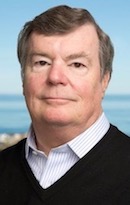
Daniel C. Lewis, the former president of the global commercial management-consulting firm Booz Allen Hamilton, has been named chairman of the Salk Institute’s board of trustees. He assumes his new role immediately. Lewis replaces Ted Waitt, chairman of the Waitt Foundation and cofounder of Gateway Inc., a pioneer in the direct marketing of personal computers.
Lewis has lent his support to the Salk Institute since 2002, initially as a member of Salk’s International Council (now the Salk Institute Council). In 2012, he and his wife, Martina, established the Daniel and Martina Lewis Chair at the Institute, currently held by Geoffrey Wahl, a professor in Salk’s Gene Expression Laboratory. That same year, Lewis joined the Salk board and currently serves on the board’s Executive Committee.
________________
Personnel Announcements
Lauren Petersen Promoted at Kimpton Solamar Hotel
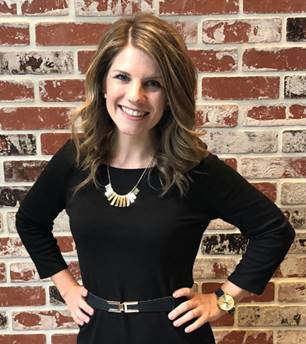
Kimpton Solamar Hotel has promoted Lauren Petersen to business development manager. In her new role, Petersen will be responsible for increasing exposure and revenue for the 235-room San Diego hotel through development of current and potential client relationships, creating new partnerships within the East Village community, programming, including events and specialty promotions, and expansion of social media.
Petersen started her hospitality career with Kimpton Solamar Hotel in March 2014 as a catering sales manager, leading sales strategies, execution of events, and managing the catering team. Prior to her time with Kimpton Hotels & Restaurants, Petersen spent over two years as catering sales and e-commerce manager at the Courtyard by Marriott San Diego Downtown, where she was responsible for all catering sales efforts, as well as managing digital channels and overall website presence.
Petersen holds a bachelor’s degree in hospitality and tourism management from San Diego State University.


